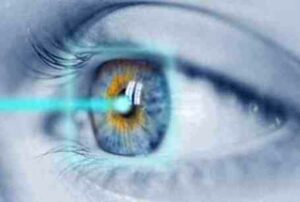If you’re looking to improve your vision, refractive surgery may be a good option for you. Refractive surgery is a category of medical procedures that aims to improve your vision by altering the shape or size of your eyes. Today, there are many different types of refractive surgery available, each with its own benefits and drawbacks. In this article, we’ll explain what refractive surgery is, discuss its various types, and give you an overview of how it works.
Contents
- 1 What is Refractive Surgery?
- 2 How Does It Work?
- 3 Safety of Refractive Surgery
- 4 Is Refractive Surgery The Same As LASIK?
- 5 Is Refractive Surgery Painful?
- 6 Does Refractive surgery Improve Vision?
- 7 At What Age Refractive Surgery Can Be Done?
- 8 How Long Does Refractive Surgery Last?
- 9 How Much Does Refractive Surgery Cost?
- 10 Are You Awake During Refractive Surgery?
- 11 Benefits And Risk
- 12 Conclusion
What is Refractive Surgery?

Refractive surgery is a surgical procedure that corrects the vision of patients with refractive errors, such as myopia (nearsightedness), hyperopia (farsightedness), and astigmatism. Many types of refractive surgery are available, including cataract surgery, laser eye surgery, and intraocular lens implantation. The surgical correction of refractive errors in the eye is called refractive surgery, a subfield of ophthalmology. The surgical correction of refractive errors in the human eye is termed refractive surgery, a subfield of ophthalmology.
Refractive surgery is performed on the eye using an optical device known as a telescope. The surgeon adjusts the optical device to create a new prescription for your glasses or contact lenses. The new prescription adjusts your eyes’ power to focus on objects in front of you.
How Does It Work?
Refractive surgery, also known as ophthalmic refractive surgery or laser eye surgery, is a medical procedure used to correct vision problems by altering the shape of the eye. Refractive surgery is typically offered as an option for people who have significant nearsightedness, far-sightedness, astigmatism, and other types of refractive errors.
As an alternative to the natural lens, an artificial lens (intraocular lens) can be implanted into the eye. Phakic intraocular lenses (PIOLs) are implanted into the eye without removing the natural lens, while refractive lens exchanges (RLEs) require the lens to be removed.
Refractive surgery can be done on either one or both eyes. The most common type of refractive surgery is called LASIK (Laser-Assisted In Situ Keratomileusis), which is performed on both eyes at the same time. LASIK is an outpatient procedure that usually takes about an hour.
Sources of Light and the Eye
Refractive surgery is a procedure used to correct and improve the vision of patients suffering from refractive errors, also known as myopia, hyperopia, and astigmatism. Refractive surgery can be performed on the eye itself (intraocular) or on the lens inside of your eye (extraocular).
There are many different types of refractive surgery available, each with its own advantages and disadvantages. Some of the most common methods used in refractive surgery include:
Laser-assisted In- Vitro Keratomileusis (LASIK): LASIK is one of the most popular forms of refractive surgery. It involves using a laser to create a smooth surface on the cornea using heat. This results in much better overall vision than traditional eyeglasses or contact lenses. The benefits of LASIK include that it is very safe and results in good visual quality in most cases. There are some minor side effects that may occur such as halos around lights or glare after surgery, but these usually go away within a few days.
Phacoemulsification: Phacoemulsification is another type of refractive surgery that uses an ultrasound device to break up the epithelial cells that line the eye’s surface. This then allows liquid to be injected into the eye to reshape
Safety of Refractive Surgery
Refractive surgery, also known as laser eye surgery, is a type of medical procedure that helps to correct vision problems caused by refractive errors in the eyes. Refractive errors are abnormalities of the eye’s lens that can cause images on objects to be blurry or distorted. Refractive surgery is often used to treat common vision problems, such as nearsightedness, farsightedness, and myopia.
There are several types of refractive surgery available, each with its own specific benefits and risks. One common procedure is called cataract surgery. Cataracts are growths on the surface of the lens that can cause blurred vision and other vision problems. Cataract surgery involves removing cataracts and restoring the lens to its original shape and size.
Laser eye surgery is another common type of refractive surgery. Laser eye surgery uses a handheld device called a laser to cut away the damaged tissue in your eyes and correct your vision. The laser uses very short pulses of light to make small cuts in your eyeball. This process causes minimal damage to your eyes and usually results in improved vision within a few hours.
Laser eye surgeries come with a few potential risks associated with them. First, laser eye surgeries may result in temporary blindness if they are done incorrectly or if the light exposure is too high for your particular type of laser eye Surgery. Second, laser eye surgeries may cause permanent damage to your eyes if they’re not performed correctly or if
Is Refractive Surgery The Same As LASIK?
An RLE procedure involves removing a patient’s natural lens and replacing it with a clear artificial lens. In LASIK surgery, an ophthalmologist reshapes a patient’s cornea using laser technology. LASIK surgery corrects vision by operating on the dysfunctional lens at the back of the eye.
There is some overlap between LASIK and RLE procedures. Both surgeries can improve a patient’s vision by correcting refractive errors. However, RLE is less invasive than LASIK and may be more appropriate for patients with mild refractive errors.
Refractive surgery is a growing industry and there are many different types of procedures available. It’s important to discuss your options with an eye doctor to find the best treatment for you. An option for improving the refractive state of the eye and reducing or eliminating the need for glasses or contact lenses is refractive eye surgery. This involves various methods of surgical remodeling of the cornea and lens implantation.
There are three main types of refractive surgery: RLE (refractive lens exchange), LASIK (laser-assisted in situ keratomileuses), and PRK (photorefractive keratectomy).
Is Refractive Surgery Painful?
You won’t feel any pain during LASIK eye surgery. Just before your procedure, your surgeon will place numbing eye drops into both of your eyes. While you may still feel some pressure during the procedure, you won’t feel anything.
Most patients report minimal post-operative discomfort and usually return to their regular activities within a few days. If you experience any pain or issue after your surgery, please contact your surgeon.
Does Refractive surgery Improve Vision?
You have a very good chance of achieving 20/25 vision or better after refractive surgery. Approximately eight out of ten people who undergo LASIK refractive surgery no longer require glasses or contact lenses.
Refractive surgery may improve vision if the underlying problem is due to an error in your natural refractive power. If your error is within ±5 D of your ideal power, refractive surgery may not be necessary. If the error is greater than 5 D, or if you have myopia greater than −6.00 diopters, then refractive surgery may be necessary to improve your vision.
At What Age Refractive Surgery Can Be Done?
The ideal age for laser vision correction is 18 to 40 years old, and most doctors prefer to operate once a prescription for glasses has been stable for a year. Almost twenty-plus years without the need for glasses is the reason for this.
There are a few exceptions to this rule. If you are near or slightly over 40 years of age, or if you have severe myopia or hyperopia, your doctor may recommend surgery sooner.
How Long Does Refractive Surgery Last?
LASIK is a permanent surgery, but the benefits may decrease over time. For most patients, the results will last a lifetime. About 10-12% of patients nationwide will need enhancement surgery due to anatomical changes.
How Much Does Refractive Surgery Cost?
Costs vary depending on the procedure performed and can range from 30,000- 80,000 INR. The exact cost estimate will be determined during your preoperative consultation, as each patient’s condition may affect the price.
Are You Awake During Refractive Surgery?
LASIK patients often wonder if they will be awake during the procedure. Yes, patients are awake during the procedure. However, there is no need to worry if you blink or move your eyes during the procedure.
Most patients feel a slight sting when the laser is used to create the flap in their cornea. The momentary pain is followed by a sense of warmth or tingling and then complete anesthesia.
Benefits And Risk
Refractive surgery has many benefits over traditional methods of vision correction. Refractive surgeries offer faster results and are less likely to cause long-term complications than other forms of vision correction such as glasses or contacts. Refractive surgeries are also more cost-effective than other forms of vision correction.
There are various benefits of refractive surgery:
- Some people may find that their vision has improved after refractive surgery.
- People who have refractive surgery may also experience less glare and better sight in low light.
- Refractive surgery may help people with nearsightedness, farsightedness, or astigmatism.
There is a risk associated with refractive surgery, including risks of infection, wrong eye surgery, and complications from the surgery itself.
Some risks of laser eye surgery are Permanent dry eye.
Halos, glare, or double vision, making it hard to drive at night. Over- or under-correction of vision, meaning you still need glasses or contacts.
Conclusion
If you are seeking eye surgery that can dramatically change your life, refractive surgery may be the perfect option for you. This type of surgery reshapes your eyes using a variety of methods, including Refractive Keratectomy (RK), LASIK and PRK. By correcting your vision with refractive surgery, you can restore clarity and brightness to your eyes, giving you a more confident appearance and improved quality of life. If you are interested in learning more about refractive surgery or considering this treatment as an option for yourself, please contact us today.
Lasik surgery is a safe 10-minute procedure to help you get rid of glasses. MantraCare offers the most advanced Lasik options. If you have any questions on lasik surgery feel free to reach out to us at +91-9711116605. We provide effective Lasik surgery in Delhi
